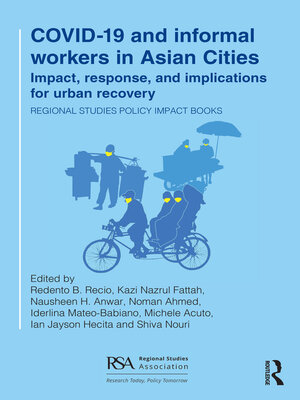COVID-19 and informal workers in Asian cities
ebook ∣ Impact, response, and implications for urban recovery · Regional Studies Policy Impact Books
By Redento B. Recio

Sign up to save your library
With an OverDrive account, you can save your favorite libraries for at-a-glance information about availability. Find out more about OverDrive accounts.
Find this title in Libby, the library reading app by OverDrive.



Search for a digital library with this title
Title found at these libraries:
| Loading... |
As COVID-19 took hold across local and international borders in 2020 and 2021, over 1.6 billion informal workers were estimated to have been adversely impacted by mobility restrictions and other 'lockdown' measures to tackle the coronavirus crisis. In the Global South, the pandemic has severely affected the sprawling megacities in Southeast and South Asia that have been driving urbanisation, and where there is a very high concentration of informal workers. This volume examines how informal workers were affected by the responses to the pandemic in five Asian megacities: Dhaka (Bangladesh), Hyderabad (India), Karachi (Pakistan), Jakarta (Indonesia), and Manila (Philippines).
Gathering voices and experiences from across these subregions, this book engages with issues surrounding state measures to manage the COVID-19 pandemic. The chapters present the gaps and lessons learned in addressing the needs of informal workers. They also shed light on grassroots solidarity initiatives, civic practices, and social networks that have cushioned the devastating effects of the crisis. The book ends with a discussion on the implications of identified state measures and citizen-led responses for (post) pandemic planning and urban governance in Asian cities in an age of recovery.






